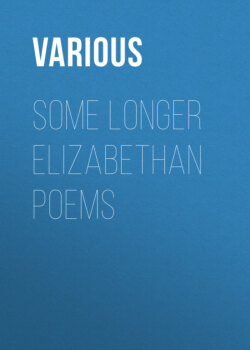Читать книгу Some Longer Elizabethan Poems - Группа авторов - Страница 10
На сайте Литреса книга снята с продажи.
ОглавлениеO that I might that singing Swallow hear,
To whom I owe my service and my love!
His sugared tunes would so enchant mine ear,
And in my mind such sacred fury move,
As I should knock at heaven's great gate above,
With my proud rhymes; while, of this heavenly state,
I do aspire the Shadow to relate.
FINIS.
[In later editions a different ending of the poem was substituted for the above, from after Stanza 126, thus:
** * * *
Here are wanting some stanzas describing Queen
Elizabeth.
Then follow these:
127.
Her brighter dazzling beams of Majesty
Were laid aside: for she vouchsafed awhile
With gracious, cheerful, and familiar eye,
Upon the Revels of her Court to smile,
For so Time's journey she doth oft beguile:
Like sight no mortal eye might elsewhere see
So full of State, Art, and variety.
128.
For of her Barons brave, and Ladies fair
(Who had they been elsewhere, most fair had been),
Many an incomparable lovely pair
With hand-in-hand were interlinkèd seen,
Making fair honour to their sovereign Queen:
Forward they paced, and did their pace apply
To a most sweet and solemn melody.
129.
So subtle and curious was the measure
With such unlooked-for change in every strain,
As that Penelope rapt with sweet pleasure
Weened she beheld the true proportion plain
Of her own web, weaved and unweaved again:
But that her Art was somewhat less, she thought,
And on a mere ignoble subject wrought.
130.
For here, like to the silkworm's industry,
Beauty itself out of itself did weave
So rare a work, and of such subtlety,
As did all eyes entangle and deceive;
And in all minds a strange impression leave.
In this sweet labyrinth did Cupid stray,
And never had the power to pass away.
131.
As when the Indians, neighbours of the Morning,
In honour of the cheerful rising Sun,
With pearl and painted plumes themselves adorning,
A solemn stately measure have begun;
The god well pleased with that fair honour done,
Sheds forth his beams, and doth their faces kiss
With that immortal glorious face of his:
132.
So * * * *]
Nosce teipsum!
This Oracle expounded in two Elegies.
1. Of Human Knowledge.
2. Of the Soul of Man, and the Immortality thereof.
LONDON:
Printed by Richard Field, for John Standish.
1599.
[This work was thus registered for publication at Stationers' Hall: 10 Aprilis [1599].
| John Standyshe | Entred for his copie A booke called Nosce Teipsum The oracle expounded in two Elegies. 1. of human kno[w]ledge. 2. of the soule of Man and th[e] immortality thereof. |
| Master Ponsonbyes [the junior Warden at the time] hand is to yt. | This is aucthorised vnder the hand of the L[ord] Bysshop of London Provyed that yt must not be printed without his L[ordships] hand to yt again. |
| Transcript &c. iii. 142. Ed. 1876. |
